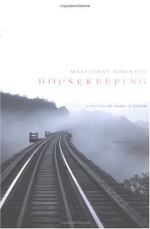|
This section contains 3,341 words (approx. 12 pages at 300 words per page) |

|
SOURCE: Ryan, Maureen. “Marilynne Robinson's Housekeeping: The Subversive Narrative and the New American Eve.” South Atlantic Review 56, no. 1 (January 1991): 79-86.
In the following essay, Ryan argues that Housekeeping subverts the traditional American myth of wandering—as presented by such canonical male writers as Herman Melville and Mark Twain—offering a feminist revision that reflects the difficulties faced by women who attempt to escape traditional roles in patriarchal society.
When Huck “lights out for the territory ahead of the rest” at the end of Adventures of Huckleberry Finn, he enacts one of the classic myths of American literature. Confronted with the frontier and the illimitable possibilities for self-development and success that open spaces imply, the male American hero, long recognized as the “American Adam,” is “an individual emancipated from history, happily bereft of ancestry, untouched and undefiled by the usual inheritances of family and race; an individual standing alone...
|
This section contains 3,341 words (approx. 12 pages at 300 words per page) |

|


